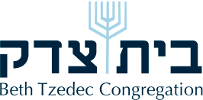Pride Month, sometimes called LGBTQ+ Pride Month, is a month dedicated to the celebration of LGBTQ+ pride, commemorating the contributions of lesbian, gay, bisexual, transgender and queer culture and community. (I use the terms Queer and Trans interchangeably with LGBTQ+). Pride Month is observed in June in many places across the world, coinciding with the anniversary of the 1969 Stonewall riots, a series of gay liberation protests.
This year, we celebrate our 70th anniversary at Beth Tzedec. Our sages taught that the Torah has 70 faces: שִׁבְעִים פָּנִים לַתוֹרָה - Shivim Panim la'Torah. We can recognize these ‘faces’ as we look from different angles. As Ben Bag Bag wrote in Pirkei Avot 5:22, the Ethics of our Fathers: הפוך בה והפוך בה שהכול בה - Hafoch ba vehafoch ba dekula ba. “Turn it over and over, for all is within it.”
There are many different faces in our community, many different identities and lived experiences. We can begin to recognize this diversity by ensuring that when we say that all are welcome, that we do our best at fulfilling our intention with actions.
For instance, ‘Access’ and ‘Belonging’ are two great places to begin our work, making sure the space and the content are available to all who want to be here with us and that when people enter and join us in our prayers and programming, they feel like they belong. What can we do to further the work of inclusion? We can lift up the efforts of our R.E.D.I. committee and invite people into the process of change when change is not always comfortable. We can attend Pride Shabbat this evening, showing up as allies and meeting someone new. We can be curious and available to hear about their lived experience, even as it may differ from our own.
Some of this conversation is uncomfortable. Here are some of the questions I hear. “Why do people need to define their gender identities? Why do there need to be more than two genders? Why should we have to change established language to accommodate others? Why do I need to say my pronouns when they are not an issue for me?” These are really good questions and you are not alone in having them. They signify some curiosity, which is exactly the place to begin when discomfort could take us into hardening, into a fixed position. I propose we learn together.
The word celebration is often used when speaking about Pride. Although it is a celebration, it is also a call for justice grounded in safety and healing. This Pride, the call for safety (in particular) is even more poignant than ever. The edict passed in the United States that declared that “there are only two genders,’ has reawakened a storm of hatred and violence that has left Queer and Trans people and their families in danger and frightened for their safety. This crisis is also affecting the LGBTQ+ community in our very own country. This is not about politics, it is about safety, care, justice and healing. We, as Jews, know all too well what it is to feel unsafe. We can empathize in our own ways, with the plight of the LGBTQ+ community here, in the States and around the world. How can we help to make our sacred home here at Beth Tzedec a safe and welcoming space for all?
I invite you to reach out so we can be in conversation, a walk, a tea. We are not going to solve anything, but we are going to open doors, the ones of our hearts and minds, so that our shul can truly welcome all the faces of Torah.





